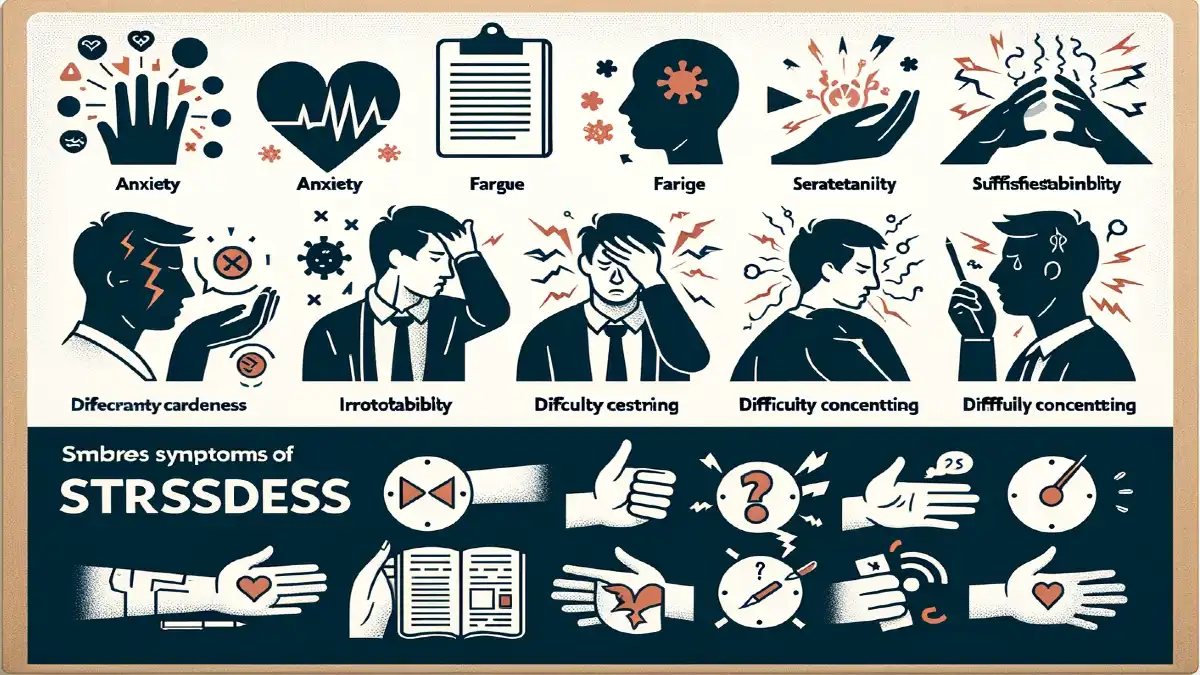How To Identify Symptoms Of Stress Disorder

Stress is one of the important survival tools in our arsenal or we can say it is an emergency reaction system of our bodies that pops out during demanding situations. The stress response can be both physical or in thoughts depending on the situation we are in.
This response system can affect our body, thoughts, and behavior in many different ways. Many a time it is quite easy to recognize when we are stressed out and sometimes it isn’t. So, in this blog, we will try to help you identify symptoms of good and bad stress disorders.
Understanding Stress
The term stress is a very misunderstood word and is generally linked to something that is bad and harmful to the body. However, that’s not the case, stress can be good in many ways and it can be bad in several ways. So, make sure to scroll down to understand what is stress and how it can influence our body in good and harmful ways.
Good Stress or Eustress
Stress is something that occurs to every one of us in day-to-day life; it is our physical and emotional response to pressure and it also prepares and protects us from harm.
In fact, having the right amount of stress can motivate us to put in that extra effort to excel in our professional, personal, and social lives; often called good stress. It is a type of stress you experience when you are excited, for example playing video games, writing assignments, public speaking, going on a date, or competing in any sports.
When this kind of stress kicks in it gives you energy, helps you focus, and improves your decision-making skills.
Bad Stress
Unlike good stress, bad stress makes you feel debilitated and it generally persists over an extended period of time. Bad stress can also prevent you from achieving your goals and impact the quality of your life. This negative and harmful response occurs when we perceive a situation as threatening or overwhelming and it makes us feel that the situation is something beyond our ability.
Bad stress can be both short-term (acute) and long-term (chronic). Our body is designed to recover from short-term stress, however, sometimes the constant experience of acute stress may lead to chronic stress which consequently leads to many stress disorders and mental health problems such as anxiety, depression, Alzheimer’s, etc.
Types of Stress Disorder
Stress disorders are types of mental health conditions that are triggered by stressful events and these disorders can be traumatic and chronic in nature. Below mentioned are some of the types of stress disorders.
- Acute Stress Disorder (ASD)
- Generalized Anxiety Disorder (GAD)
- Post-Traumatic Disorder (PTSD)
- Adjustment Disorder
Key Areas of Symptoms
Stress disorders encompass a spectrum of conditions each with its own nuances of symptoms, however, these symptoms are categorized into three aspects which are:-
Emotional
Dealing with stress can often feel like riding an emotional rollercoaster and it manifests as changes in mood, feeling, and overall emotional well-being. Some of the emotional aspects of stress include.
- Anxiety
- Irritability
- Depression
- Mood Swing
- Overwhelmed
Physical
Stress doesn’t just mess with your mind, it can have tangible effects on your body leading to various physical symptoms including:
- Headache
- Muscle Pain and Tension
- Tiredness
- Sleep Disturbance
- Digestive problems
Behavioral
Behavioral changes are often observable in individuals dealing with stress and they can influence the way one acts and responds. Some of the behavioral symptoms of stress disorder include:-
- Changes in Eating Habits
- Increased Substance Use
- Social Withdrawal
- Procrastination
- Difficulty Making Decision
Strategies to Manage Stress
Navigating through the tempest of stress requires well-planned strategies that will serve as an anchor and compass on your journey. We have compiled a list of simple yet powerful strategies to help you manage your stress.
Mind-Body Connection
It is a technique that is based on the belief that what feel and think can positively and negatively impact both physical and mental well-being. Embracing this connection can help you manage distress. Practices like yoga, meditation, and deep breathing exercises can be your partner in bringing harmony and help you navigate through this tough phase.
Healthy Lifestyle Choices
Indulging or choosing healthy lifestyles like regular exercise, a balanced diet, and maintaining regular sleep patterns are like giving a spa day for your body amidst the commotion.
Social Support
We are social animals and it is in our nature to build a social network around us and this becomes of paramount importance during times of stress. When we are going through a tough phase of life, having social support offers a shoulder to lean on and share your concerns.
Seek Professional Help
When you start to see stress as a mountain unclimbable, seeking professional help is always a wise and courageous choice. Therapists, counselors, psychologists, and other mental health professionals offer personalized strategies, coping mechanisms, safe environment to explore and understand the cause of stress.
Conclusion
Stress is ubiquitous in modern life, and lurks ever closer than we acknowledge. While its role in our survival is undeniable, however, in today’s world of deadlines, expectations, and uncertainties, it can change from a motivator to a malevolent force. It unveils its presence in our body, mind, and behavior through many symptoms and these symptoms are not mere inconvenience, these are red flags that indicate its control on our well-being. Recognizing its grip early on becomes crucial to safeguarding our mental well-being.
